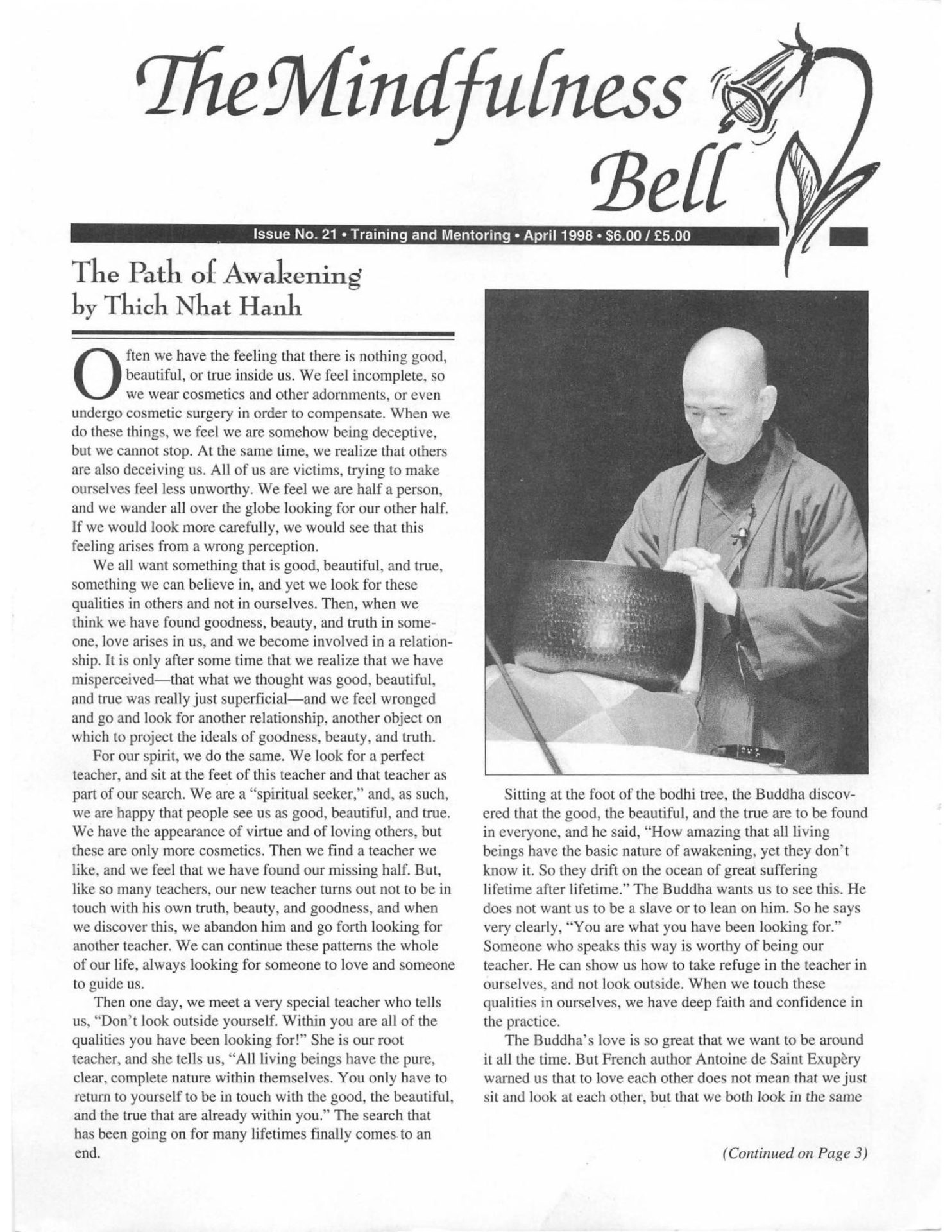The following two proposals are offered by Minh Tran and Rowan Conrad on behalf of the Order of Interbeing Education and Training Committee. When approached by an aspirant to the Order of Interbeing, Order members may wonder how to help. What will nourish and support the aspirant? What is expected? The Order Charter, found in Interbeing (third edition, Parallax Press, 1998), outlines the basic requirements for ordination into the Order.
In support of mentors and aspirants,
The following two proposals are offered by Minh Tran and Rowan Conrad on behalf of the Order of Interbeing Education and Training Committee. When approached by an aspirant to the Order of Interbeing, Order members may wonder how to help. What will nourish and support the aspirant? What is expected? The Order Charter, found in Interbeing (third edition, Parallax Press, 1998), outlines the basic requirements for ordination into the Order.
In support of mentors and aspirants, the Education and Training Committee of the Order of Interbeing suggests using the first stage of the four-stage Education and Training Program proposed by Thay and Sister Annabel in 1996, with two basic differences. In this program, mentors need not be senior monastic Dharmacharyas (Dharma teachers), but may be lay Dharmacharyas or other Order members. The Committee suggests that Order mentors be senior Order members (members for at least five years) whenever possible. Secondly, aspirant training does not need to be in a retreat setting, although attending retreats is encouraged and expected.
The mentoring program is a guide for the study and practice of Buddhist teachings in the tradition of Thich Nhat Hanh. Its intent is to stimulate individual and collective transformation, increase happiness and stability, develop bodhichitta, and encourage a deepening mindfulness practice. We hope that practice with this program will support aspirants in their efforts to bring happiness to others and relieve suffering, and to build and support Sanghas. These are the real reasons for receiving Order ofInterbeing ordination.
All those involved in training-mentors, aspirants, and local Sanghas-should be aware that the program requires study and practice. Regular practice is essential to realize the depth of the teachings leading to transformation. Mindfulness is at the core of all efforts.
As the Charter explains, an aspirant must have received the Five Mindfulness Trainings. The aspirant then announces his or her desire to train for 01 ordination by written letter or application to the local Order members or to a Dharma teacher. One or more OI core community members then mentor the aspirant for a minimum of one year.
When the aspirant and mentors perceive that the aspirant is ready, the mentors write to Thay or to the ordaining Dharma teacher recommending ordination. The letter of recommendation indicates the aspirant is deeply engaged in active, daily practice that will allow him or her to achieve increasing stability, happiness, and transformation. Academic understanding alone would not support a recommendation. In addition, Order members and aspirants are expected to actively participate in and support their Sangha. As Thay said, "Only when you have the feeling that you have enough time, energy, and interest to take care of a community should you ask for formal ordination." After careful consideration, Thay or a qualified Order Dharma teacher may issue a formal ordination invitation.
The Education and Training Committee would like to hear from everyone involved in aspirant mentoring. We invite you to tell us the names of mentors and aspirants, the mentoring plan, and the current stage. Please contact Chan Ruy (Minh Tran), 9089 Richmond, Brossard, PQ, Canada J4X-2S1, telephone: 514-591-8726, fax: 514-466-8958; email: chanhuy@prisco.net.

